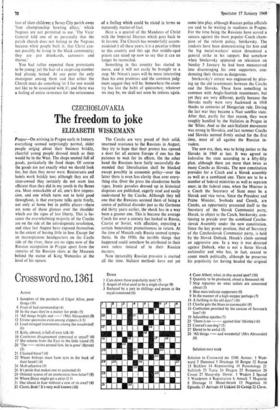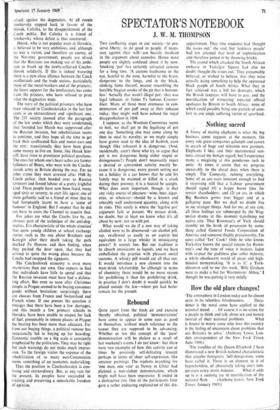The freedom to joke
CZECHOSLOVAKIA ELIZABETH WISKEMANN
Prague—On arriving in Prague early in January everything seemed surprisingly normal, older people setting about their business briskly, cheerful young people dressed much as they would be in the West. The shops seemed full of goods, particularly the food shops. Of course the goods are not exactly what we should look for, but then they never were. Restaurants and hotels work briskly too; although they are all state-owned they certainly do not seem less efficient than they did in my youth in the Benes era. Most remarkable of all, one's first impres- sion, and one which turns out to hold good throughout, is that everyone talks quite freely, not only at home but in public places—there are none of those glances over the shoulder which are the signs of lost liberty. This is be- cause the overwhelming majority of the Czechs are on the side of the anti-dogmatic revolution, and since last August have exposed themselves to the extent of having little to lose. Except for an inconspicuous headquarters on the Castle side of the river, there are no signs now of the Russian occupation in Prague apart from the remains of the Russian shots at the Museum behind the statue of King Wenceslas at the head of his square. The Czechs are very proud of their solid, unarmed resistance to the Russians in August; they try to hope that their protest has opened a door for all eastern Europe if one has the patience to wait for its effects. On the other hand the Russians have fairly successfully de- manded that liberalisation shall be blocked except possibly in economic policy—over the latter there is even less clarity than over every- thing else. Over the press the clandestine battle rages. Ironic parodies dressed up in historical disguises are published, eagerly read and easily understood by the Czechs. Although they tell one that the Russians accused them of being a centre of political disorder just as the Germans did thirty years earlier, the shock has in a way been a greater one. This is because the average Czech for over a century has looked to Russia, Czarist or Soviet, with affection, expecting a certain benevolent protectiveness in return. At the time of Munich only Russia seemed sympa- thetic. In the 1950s the terrible things that happened could somehow be attributed to their own rulers instead of to their Russian masters.
Now inexorably Russian pressure is exerted all the time. Stalinist methods have not yet
come into play, although Russian police officials are said to be waiting in readiness in Prague. For the time being the Russians have scored a success against the most popular Czech 'cham- pion of the reform policy, Smrkovsky. The students have been demonstrating for him and the big metal-workers' union threatened a general strike in his support. But somehow when Smrkovsky appeared on television on Sunday 5 January he had been manoeuvred into discouraging his own supporters, con- demning their threats as dangerous.
Smrkovsky's retreat was engineered by play- ing up the old resentments between the Czechs and the Slovaks. These have something in common with Anglo-Scottish resentments, but yet they are very different, partly because the Slovaks really were very backward in 1918 thanks to centuries of Hungarian rule. During the last war they became a Nazi satellite state. After that, partly for that reason, they were roughly handled by the Stalinists in Prague in the 'fifties. And so the anti-Stalinist movement was strong in Slovakia, and last summer Czechs and Slovaks seemed firmly united for the first time, most of all against the Russian in- vaders.
The new era, then, was to bring justice to the Slovaks in 1969 at last. It was agreed to federalise the state according to a fifty-fifty plan, although there are more than twice as many Czechs as Slovaks. The new constitution provides for a Czech and a Slovak assembly as well as a combined one. There are to be a number of federal ministries as well as separate ones; in the federal ones, when the Minister is a Czech the Secretary of State must be a Slovak and vice versa. Since the President and Prime Minister, Svoboda and Cerra, are Czechs, an opportunity presented itself to the Secretary of the Slovak Communist party, Husak, to object to the Czech, Smrkovsky, con- tinuing to preside over the combined Czecho- slovak Assembly under the new constitution. Since the key power position, that of Secretary of the Czechoslovak Communist party, is held by the Slovak Dubcek, Husak's claim seemed an aggressive one. In a way it was directed against Dubcek, who is not a fierce Slovak nationalist and who has, in fact, ceased to count much politically, although he preserves his popularity for having headed the original
attack against the dogmatists.. At all events Smrkovsky stepped back in favour of the Slovak, Colotka, to the disappointment of the Czech public. But Colotka is a friend of Smrkovsky whose defeat is thus- countered.
Husak, who is not popular even in Slovakia, is believed to be very ambitious, and, although he was a victim, and therefore an enemy, of the Novotny government, people are afraid that the Russians are making use of his ambi-
tion to break up the newly-achieved Czecho- Slovak solidarity. If this is indeed wavering there is a new close alliance between the Czech intellectuals and the trade unions, particularly, those of the metal-workers and of the printers; the latest support for the intellectuals has come from the printers, who have refused to print what the dogmatists want.
The story of the political prisoners who have been released in Czechoslovakia in the last few years is an extraordinary and significant one. t The 231 society (named after the paragraph of the law under which they were condemnedk they founded last March was suppressed after.,
the Russian invasion, but rehabilitation seems to continue, and they hope all the time to get back their confiscated flats and motor-cars and the rest: transitionally they have been given some money to live on. Some, like Husak him- self, have risen to prominent political positions. The ones for whom one's heart aches are former followers of Benes, who were with the Czecho- slovak army in Britain during the war. For no, other crime they were arrested after 1948 by Czech police, then handed over to Russian torturers and forced labour of a pretty frightful kind. These,people have now been freed, many aged sixty or seventy, to start life again; one of them gallantly said to a friend of mine that he had fortunately learnt to have a 'sense of humour' in England. But I suspect that he did,
not have to cross the Channel to acquire that. For jokes are what the Czechs live by, an obvioui part of the technique of the anti-dog-0, matists. It is characteristic of the whole situation•
that quite young children at school exchange stories such as the one about Brezhnev and Kosygin after their death taking the path marked To Heaven, and then finding, when they pushed the door open, that they had arrived in quite the wrong place because the Czechs had swapped the signposts.
The Czechoslovak economy is even more mysterious than our own. One expects to find that individuals have little to spend and that the Russian invasion must have had a disloca- ting effect. But even so soon after Christmas people in Prague seemed to be buying consumer goods without hesitation; surprisingly there are cheeses from France and Switzerland and French wines. If one presses the question it emerges that there have been a few shortages, and this month a few primary schools in Slovakia have been unable to reopen for lack of fuel, presumably in remote places; in Prague the heating has been more than adequate. Far from not buying things, a political Tumour has occasionally led to buying up for hoarding. Economic trouble on a big scale is constantly prophesied by the politicians. They may be right but such warnings do not make much' impres- sion. To the foreign visitor the expense of the rehabilitation of so many non-Communists seems something of an economic undertaking.
Thus the position in Czechoslovakia is con- fusing and extraordinary. But, at any rate for the present, its peoples have succeeded in creating and preserving a remarkable freedom of opinion.



































 Previous page
Previous page